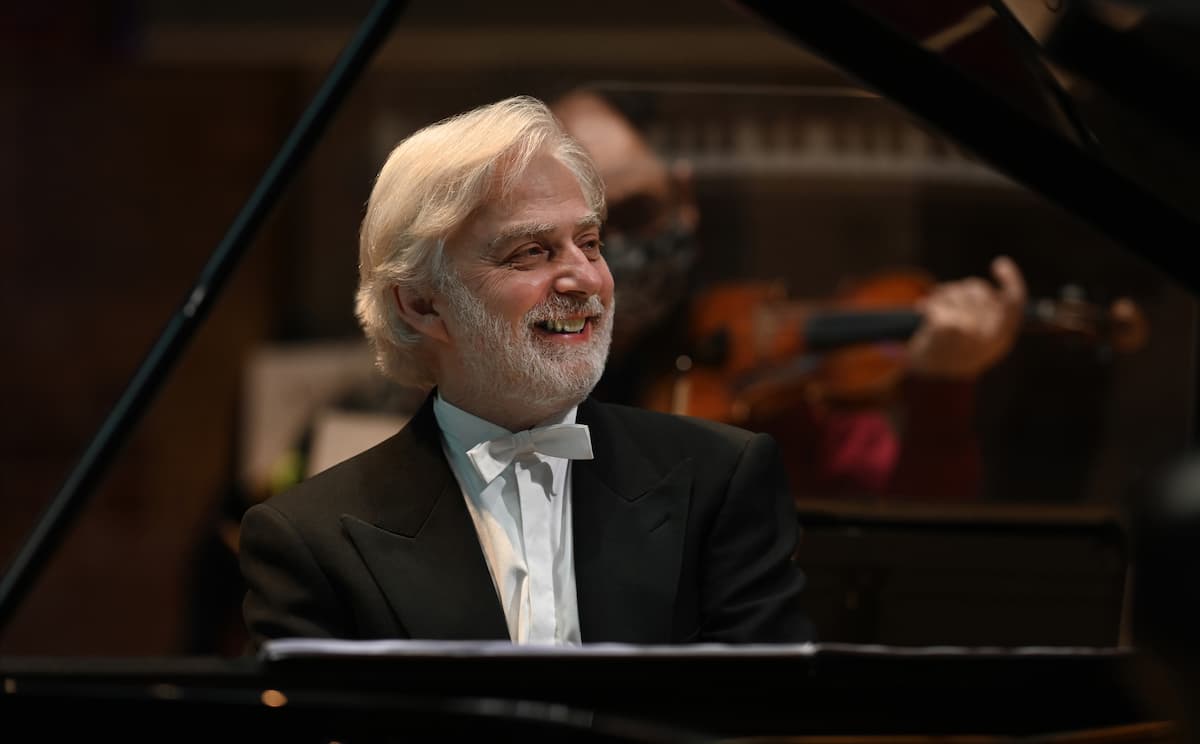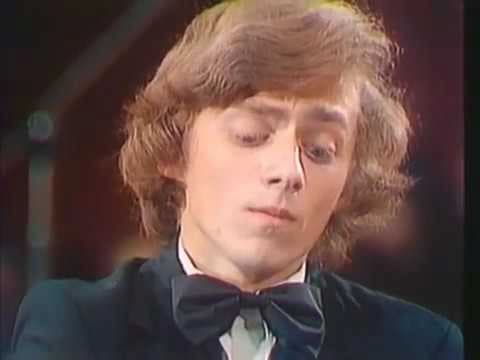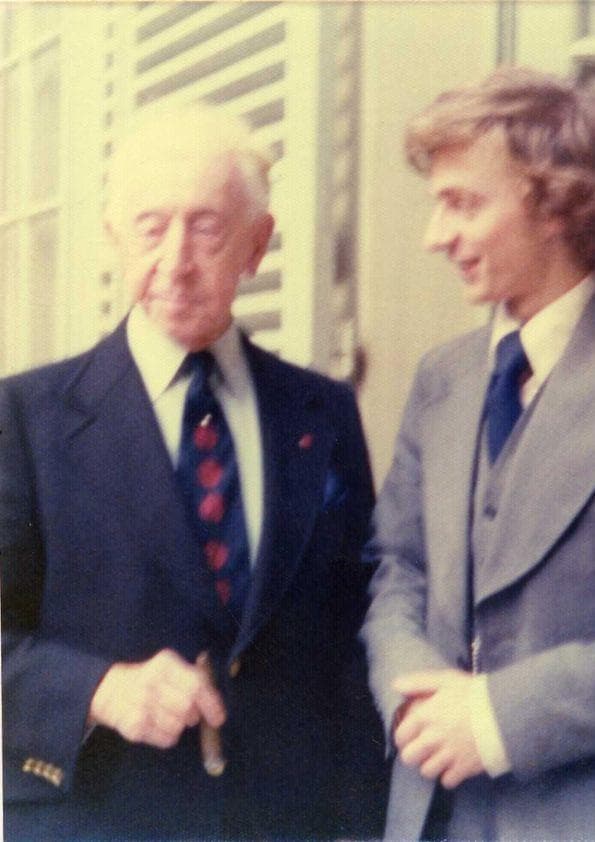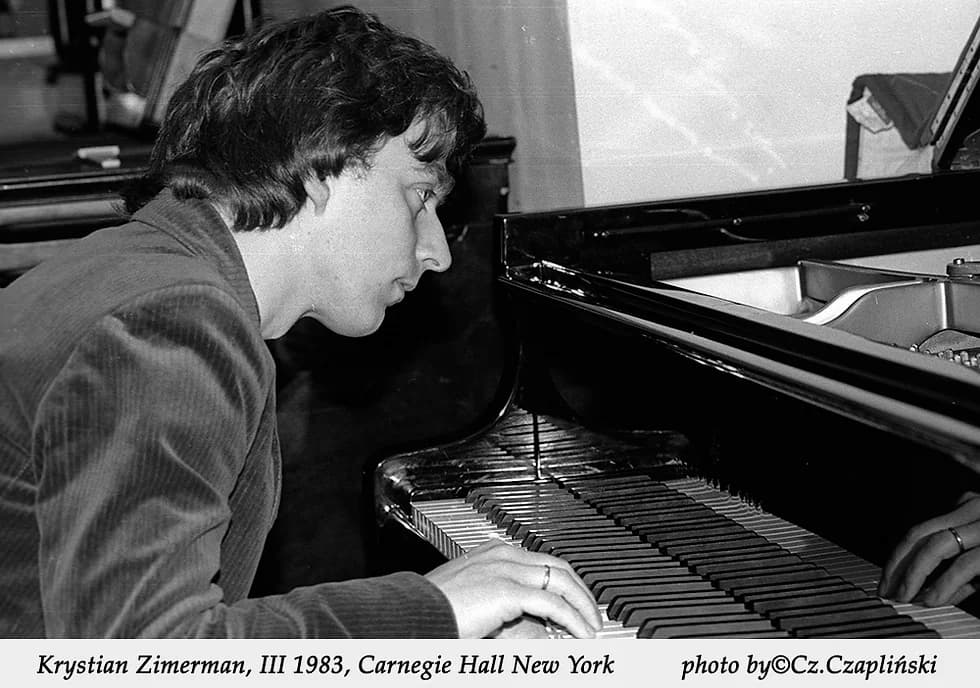Krystian Zimerman is one of the rare cult figures among pianists today. In fact, there are not enough superlatives to describe his pianism, or what he calls “the art of organising emotions in time.” Anything he touches reveals infinite expressive subtleties and an underlying clarity that places him among today’s elite artists. A critic described his approach as “a dynamic process of creative evolution, one in which self-criticism, deep reflection, and intuition play significant parts.”
Krystian Zimerman Plays Chopin’s Piano Sonata No. 2, Op. 35 “Grave-Doppio movimento”
The Early Years

Krystian Zimerman
Krystian Zimerman was born into a musical family in Zabrze, a small mining town near Katowice in southern Poland on 5 December 1956. He was the only child of an engineer who was also a keen amateur musician. Countless musicians visited the household in musical gatherings that introduced the infant to the process of chamber music-making. He took it for granted that every household would have a piano and was shocked to discover that this was simply not the case.
He first took piano lessons from his father at the age of five and subsequently studied privately with Andrzej Jasiński. Jasiński was an honour graduate from the University of Music in Katowice, and he won the Maria Canals Competition. Completing his training with Magda Tagliaferro, he launched his international career and established himself as a highly sought-after pedagogue at the Katowice Conservatory. Jasiński was essentially, Zimerman’s only teacher, and he describes him as “so honest and without any poses, very natural.”
Krystian Zimerman Plays Szymanowski’s Mazurka Op. 50. No. 13
Chopin International Competition

Krystian Zimerman at the 1975 Chopin Competition
In 1975, Zimerman won the International Chopin competition, the youngest pianist to be awarded the first prize. He actually won all the special awards as well, including the best performance of polonaise and mazurkas, and a critic wrote, “The specific aura that he creates around himself as well as his unusual ability to create his own magnificent musical world, where every sound that he plays is extremely significant, are foundations of his phenomenon.”
His win at the Chopin competition immediately catapulted Zimerman into the international limelight, but instead of embarking on a schedule packed with concerts around the world, Zimerman withdrew. Backstage he had met one of his greatest heroes, Arthur Rubinstein, who invited him to Paris. Rubinstein started to shape Zimerman’s approach to live performance, telling him “You know, we played differently than you do today. There were no microphones. We played the beginning, then improvised a bit and played some other parts, maybe the end. We played the most important thing in the music: the reason why the composer composed the music.”
Franz Schubert: Piano Sonata No. 21 in B-Flat Major, D. 960 (Krystian Zimerman, piano)
The Sabbatical

Arthur Rubinstein and Krystian Zimerman
Zimerman has always disliked the expression “to play music.” For him, the most important thing is the credibility of the art. “What is happening in a concert is really happening; it’s a kind of life and death experience, very high risk. Craftsmanship is just a tool. On the stage, you forget everything you learn and just be the music.”
In 1980, Zimerman stepped back and took a 14-month sabbatical in London. Once he returned to the concert platform his playing had become more intensive, majestic, daring, and full of vitality. He attributes this new way of playing and thinking to his refusal to give more than 50 or 60 concerts a year. His extraordinary personal standards have become ever more demanding, and he is still striving for perfection and broadening how seemingly well-known compositions are perceived.
Krystian Zimerman Plays Beethoven’s Piano Concerto No. 3, Op. 37
Speaking His Mind
His ever-questing approach to music has resulted in jaw-dropping performances and recordings, but he rarely speaks in public or gives interviews. However, never shy to publicly voice his convictions if pressed, he has courted a number of controversies. Political opinions aside, he has also taken on the all-powerful recording industry. As he remarked in 1999, “I do not know if you have noticed that all orchestras today play the same way. Relying on one’s ears alone, it is impossible to tell if one is listening to a London orchestra, one that is Parisian, New York-based, or from Tokyo. The recording industry has succeeded in globalizing interpretation.”

Krystian Zimerman performing at the Carnegie Hall, 1983
Zimerman lamented the fact that he had trouble finding unique performance characteristics in the existing orchestra. In addition, orchestras dislike rehearsing, “and I love to rehearse, for weeks at a time even.” His views have predictably provoked a lot of discussion on the boundaries of interpretation of classical music, but he remains passionate about creating music that blends his experiences over many decades. Preparing every meticulous detail, Zimerman still studies works for decades, exploring every facet and contemplating its meaning before introducing it to his recital repertoire or taking it into the studio. For Zimerman, music should transport the listener into a completely different and unique universe.
For more of the best in classical music, sign up for our E-Newsletter

I am/was a devotee of Zimerman’s pianistic gifts (which included building keyboards, shipping his pianos to concert locations and as well as amazing technical feats, but he refused to return to the US over a political issue. I’ve been unable to hear him live since!